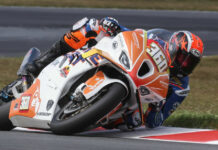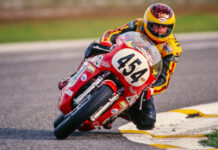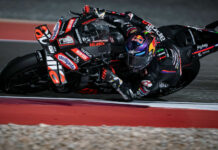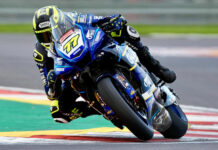Completely made over in 2006, the Suzuki GSX-R600 has received more than the usual two-year facelift for 2008. The ram-air-fed, liquid-cooled, DOHC, 599cc Inline Four engine still has a bore and stroke of 67.0 x 42.5mm, but new forged aluminum pistons and a new shape for the Twin-Swirl Combustion Chamber (TSCC) result in more compression (12.8:1 vs. 12.5:1) than on the 2006-2007 version. The new combustion chamber shape is also claimed to reduce shrouding of the intake valves at low lift and to promote better cylinder charging, which is claimed to produce more power. Each cylinder still has four titanium valves, a pair of 27.2mm intake valves and a pair of 22.0mm exhaust valves, and single valve springs are still used to reduce mechanical losses. Larger (25 vs. 24mm) valve tappet buckets on the exhaust side allow the use of new camshaft profiles for better “acceleration coming off corners.” The double overhead camshafts are still chain-driven. The top end of the engine (the upper crankcase and cylinders are one casting) has been cast with thinner walls to save some weight. New 10mm iridium-tipped NGK spark plugs create a hotter spark and are longer lasting and are fired by narrower-diameter (20 vs. 22mm) plug-top coils. Redline of the engine remains 16,000 rpm. The new slipper pistons have three rings, and the upper compression ring and the “oil control” ring have a chrome-nitride coating to reduce friction and increase cylinder seal. Larger ventilation holes (41 vs. 39mm) between cylinders reduce internal pumping pressure and mechanical losses. Ribbing has been added to the magnesium clutch cover and oil sump to reduce mechanical engine noise. A lighter (by 155 grams) and more compact starter motor is new for 2008, while the generator puts out more electrical power without gaining size or weight. The six-speed, close-ratio transmission is unchanged and still comes with a back-torque-limiting (slipper) clutch. Intake and exhaust paths are new on the 2008 GSX-R600. The ram-air intakes for the new, more aerodynamic bodywork have been relocated closer to the center of nose, where air pressure is said to be greatest, and now comes with a louvre system in place of the previous mesh screens, resulting less resistance and higher airbox pressure. The bodywork is wider at the handlebars and slimmer at the belly pan to reduce drag. A three-headlight array (the center light is the low beam, and all three bulbs light up on high beam) gives the bike better lighting and a fresh look. In order to meet the new, stricter EURO 3 and Tier 2 emissions requirements, the GSX-R600 gets a larger-volume, triangular-section muffler. An Engine Control Unit-controlled (ECU) butterfly valve (Suzuki Exhausts Tuning/SET) is still fitted in the mid-pipe, between the header pipe collector and in front of the catalytic converter, under the engine. A pair of new, double-barreled 40mm throttle bodies still come equipped with Suzuki Dual Thottle Valve (SDTV) and two new fuel injectors per throttle body. Each of the fuel injectors now have eight holes instead of four, producing a finer spray of fuel for better atomization and combustion. The primary injectors, which operate under all conditions, have been set at a steeper angle (41°) for a straighter shot at the intake ports. The secondary injectors, which are used in high-rpm/high-load situations, are now angled at 15° but still bounce their spray off the opened secondary butterflies. The secondary butterflies, like the fuel injectors, are controlled by a new, lighter (40 grams), smaller and more powerful (32-bit processor with 1024 kb of ROM memory) ECU to provide the optimum air, fuel and spark for any given situation. Like its bigger brother, the 2007 GSX-R1000, the GSX-R600 now comes with Suzuki Drive Mode Selector (S-DMS), a three-way switch located on the right handlebar that allows the rider to choose between three engine control maps (A, B and C) to tailor the power delivery of the engine to suit certain situations, like rain or worn out tires at a track day or race. The maps can be selected and switched on-the-fly. The chassis remains much as it was introduced in 2006. The aluminum alloy main frame is constructed of five, “precision-cast” pieces to achieve a “specific torsional rigidity.” The braced aluminum alloy swingarm is constructed of die-cast sections and extrusions, and works with an RM-Z-inspired rear shock linkage and a four-adjustable Showa shock. Showa also manufactures the inverted, 41mm, three-way-adjustable forks. For 2006, the two-piece, die-cast, rear subframe has been converted to a single-piece unit to save 125 grams. In addition, the newest Suzuki middleweight comes with an ECU-controlled steering damper in place of the old, non-adjustable unit. A new design allows the 3.50 x 17.0 inch front and 5.50 x 17.0 inch rear wheels to be more rigid, stronger and lighter (by 430 grams total). The wheels come wearing 120/70-ZR17 front and 180-55-ZR17 rear sport radials made specifically for the bike by Bridgestone. More weight was shaved by using thinner (5.0 vs. 5.5mm) front brake rotors (still 310mm/12.2 inches) and smaller brake rotor mounting bolts. The front rotors continue to be grabbed by radial-mounted, four-piston Tokico calipers, but smaller-diameter, low-expansion brake lines and a smaller-diameter (17 vs. 19mm) radial master cylinder have been added to improve braking performance and feel. Wheelbase remains 55.1 inches (1400mm), rake is still 23.8°, trail stays at 3.9 inches (98mm) while claimed dry weight has gone up from 354 pounds (160 kg) to 359 pounds (163 kg). The 2008 Suzuki GSX-R750, which is built using many of the same parts as the GSX-R600, gets many of the same improvements and retains many of the same carry-overs as its smaller sibling. It doesn’t, however, get all of the improvements the GSX-R600 receives in order to keep up in its highly-competitive categories, on the track and on the street. The GSX-R750 is still powered by a liquid-cooled, ram-air-fed, DOHC, 749cc (70.0 x 48.7mm bore x stroke) Inline Four. Its compression ratio remains at 12.5:1, and its redline stays at 15,000 rpm. It still has four titanium valves per cylinder (29.0mm intake, 23.0mm exhaust). Unlike the GSX-R600, the GSX-R750’s valve bucket tappets remain the same size, it does not get a new combustion chamber shape and it does not get new pistons. It does, however, get the larger (41 vs. 39mm) ventilation holes between cylinders; the hotter, longer-lasting, Iridium-tipped, 10mm NGK spark plugs; the narrower plug-top coils; the smaller and lighter starter motor; the more powerful generator; the larger-volume, triangular-section muffler; new 48mm SDTV double-barreled throttle bodies; new eight-hole fuel injectors set at new angles; a new, smaller, lighter, more powerful (32-bit, 1024 kb ROM) ECU; and the three-way Suzuki Drive Mode Selector system. In addition to its slipper-clutch-equipped, six-speed, close-ratio gearbox, the GSX-R750 retains many of its chassis components, including its aluminum alloy main frame, braced aluminum alloy swingarm, four-way-adjustable Showa shock, 41mm three-way-adjustable inverted Showa forks and radial-mount Tokico four-piston front brake calipers. New for the 2008 GSX-R750’s chassis are the lighter one-piece subframe, ECU-controlled steering damper, stronger and lighter wheels, thinner front brake rotors, lighter front brake rotor mounting bolts, new front brake lines, a smaller-diameter radial front brake master cylinder, a larger-capacity (17.0 vs. 16.5-liter) fuel tank, new ram-air intakes and new bodywork. Wheelbase is still 55.1 inches (1400mm), rake and trail are still 23.8° and 3.9 inches (98mm) and claimed dry weight has gone up from 359 pounds (163 kg) to 364 pounds (165 kg). Prices and availability dates for the 2008 GSX-R600 and GSX-R750 were not available at post time.
Suzuki Releases Details On The Revised-for-2008 GSX-R600 And GSX-R750
Suzuki Releases Details On The Revised-for-2008 GSX-R600 And GSX-R750
© 2007, Roadracing World Publishing, Inc.






